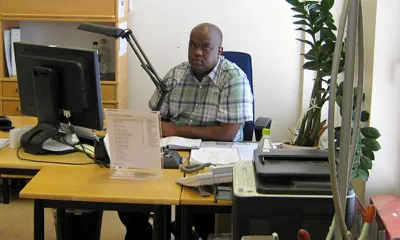I must have received at least a dozen communications from worried friends and colleagues, asking the whereabouts of the chief editor of the highly critical Rwandan website, Umuvugizi. By mid-January, no one had heard from John Bosco Gasasira, nothing new had been published on Umuvugizi since January 11, and his cell phones were switched off. Last week, concerned colleagues wrote a public letter expressing concern over their missing colleague.
“I could not keep my phones on. I knew Rwandan agents were hunting me,” Gasasira told me. He had decided to go into hiding. Gasasira alleges that Rwandan agents in Sweden have been monitoring him since September 2010 and even attempted to poison him that month. “Ever since September 2010 I was protected by Swedish authorities — they have really helped me.”
His claim would sound preposterous except for the fact that European governments have accused the Rwandan government of using agents to target opponents abroad. In 2011, London’s Metropolitan Police warned three Rwandan nationals living in Britain that the Rwandan government posed an imminent threat to their lives, the BBC reported. The Rwandan High Commissioner in Britain rejected the police claims.
But last week, Swedish officials evicted the second-highest ranking Rwandan embassy official, Evode Mudaheranwa, for “refugee espionage,” the Associated Press reported. “Evode Mudaheranwa was evicted the same day I came out of hiding,” Gasasira told me.
Neither government has commented on the eviction, according to international reports. One thing is certain though — Gasasira has reason to be wary of Rwandan authorities. After three men beat him severely with iron bars in 2007; his newspaper was suspended in Rwanda in April 2010; and his deputy editor assassinated in unclear circumstances in July that year, it is no wonder Gasasira fled the country and lives in exile in Sweden. (In December, a Rwandan journalist was shot dead by unknown assailants in Kampala, the capital of neighboring Uganda. Rwandan mourners at his funeral reported being scared of Rwandan agents in Kampala).
Judging by the plethora of scathing articles against the Rwandan government on his website, Gasasira’s unpopularity with Rwandan authorities would also not be surprising. Stories published in 2010 and 2011 claim President Kagame used public funds to purchase a private jet and a house in Britain, and set up a bank account in Mauritius to launder money.
“Paul Kagame wants to destroy the Rwandan media and he does this by forcing journalists into exile. You find many Rwandan journalists go into exile but cannot afford to continue the profession,” Gasasira said. Umuvugizi has managed to continue and, according to Gasasira, has more impact as a website than when it was published as a weekly newspaper back home in the capital, Kigali. “Our statistics show this. In Kigali we were read by 3,000 people, now we are read by 7,000 people online per day,” he said. Although the site is periodically blocked in Rwanda, local journalists told me, many are able to access Umuvugizi articles through other websites such as Twitter and Facebook.
All this leads Gasasira to stay cautious. “All along I’ve been limiting my movements in Sweden,” he told me, “I don’t go to public places like normal people, but that’s life — if I don’t do this who knows what might happen.”
